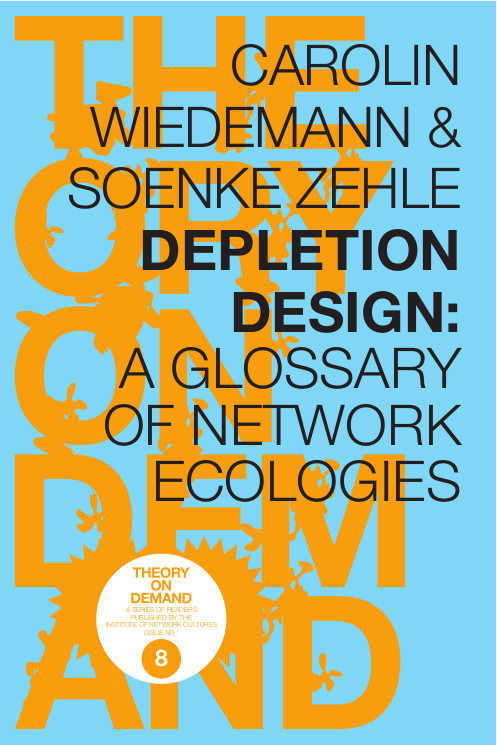Carolin Wiedemann, Soenke Zehle (eds.): Depletion Design: A Glossary of Network Ecologies (2012)
Filed under book | Tags: · algorithm, anonymous, architecture, biopolitics, commons, creative industries, cyborg, design, ecology, hackerspace, media ecology, network ecology, networks, politics, remix, software, spam, technology, theory

“Depletion Design suggests that ideas of exhaustion cut across cultural, environmentalist, and political idioms and offers ways to explore the emergence of new material assemblages. Soenke Zehle and Carolin Wiedemann discuss Depletion Design with Marie-Luise Angerer, Jennifer Gabrys and David M. Berry, inviting tm13 participants into a collaborative reflection on the necessity to understand human beings as one species among others – constituted by interactions of media, organisms, weather patterns, ecosystems, thought patterns, cities, discourses, fashions, populations, brains, markets, dance nights and bacterial exchanges (Angerer); on the material leftovers of electronics as provocations to think through and rework practices of material politics that may be less exploitative within our natural-cultural relationships (Gabrys); and on lines of flight from and through the computational – about expanding them into new ways of living beyond current limitations and towards new means of judgment and politics (Berry).
We, or so we are told, are running out of time, of time to develop alternatives to a new politics of emergency, as constant crisis has exhausted the means of a politics of representation too slow for the state of exception, too ignorant of the distribution of political agency, too focused on the governability of financial architectures. But new forms of individual and collective agency already emerge, as we learn to live, love, work within the horizon of depletion, to ask what it means to sustain ourselves, each other, again. Of these and other knowledges so created, there can no longer be an encyclopedia; a glossary, perhaps.”
Contributors: Marie-Luise Angerer (Cyborg), Franco ‘Bifo’ Berardi (Exhaustion, Soul Work), David M. Berry (On Terminality), Zach Blas (Queer Darkness), Drew S. Burk (Grey Ecology), Gabriella Coleman (Anonymous), Heidi Rae Cooley (Ecologies of Practice), Sebastian Deterding (Playful Technologies, Persuasive Design), Jennifer Gabrys (Natural History, Salvage), Johannes Grenzfurthner & Frank A. Schneider (Hackerspace), Eric Kluitenberg (Sustainable Immobility), Boyan Manchev (Disorganisation, Persistence), Lev Manovich (Software), Sonia Matos (Wicked Problems), Timothy Morton (Ecology without Nature), Jason W. Moore (Crisis), Anna Munster (Digital Embodiment), Eduardo Navas (Remix[ing] Re/Appropriations), Brett Neilson (Fracking), Sebastian Olma (Biopolitics, Creative Industries, Vitalism), Luciana Parisi (Algorithmic Architecture), Jussi Parikka (Dust Matter), Judith Revel (Common), Ned Rossiter (Dirt Research), Sean Smith (Information Bomb), Hito Steyerl (Spam of the Earth)
Publisher Institute of Network Cultures, Amsterdam, Dec 2012
Theory on Demand series, 8
Creative Commons Attribution-NonCommercial-ShareAlike 3.0 Netherlands License
ISBN 9789081857512
via jussiparikka.net
PDF, PDF (updated on 2015-7-9)
Comment (0)Parmy Olson: We Are Anonymous: Inside the Hacker World of LulzSec, Anonymous, and the Global Cyber Insurgency (2012)
Filed under book | Tags: · anonymous, hacking, hacktivism, internet, internet culture, lulzsec, security, web

“A thrilling, exclusive expose of the hacker collectives Anonymous and LulzSec.
WE ARE ANONYMOUS is the first full account of how a loosely assembled group of hackers scattered across the globe formed a new kind of insurgency, seized headlines, and tortured the feds-and the ultimate betrayal that would eventually bring them down. Parmy Olson goes behind the headlines and into the world of Anonymous and LulzSec with unprecedented access, drawing upon hundreds of conversations with the hackers themselves, including exclusive interviews with all six core members of LulzSec.
In late 2010, thousands of hacktivists joined a mass digital assault on the websites of VISA, MasterCard, and PayPal to protest their treatment of WikiLeaks. Other targets were wide ranging-the websites of corporations from Sony Entertainment and Fox to the Vatican and the Church of Scientology were hacked, defaced, and embarrassed-and the message was that no one was safe. Thousands of user accounts from pornography websites were released, exposing government employees and military personnel.
Although some attacks were perpetrated by masses of users who were rallied on the message boards of 4Chan, many others were masterminded by a small, tight-knit group of hackers who formed a splinter group of Anonymous called LulzSec. The legend of Anonymous and LulzSec grew in the wake of each ambitious hack. But how were they penetrating intricate corporate security systems? Were they anarchists or activists? Teams or lone wolves? A cabal of skilled hackers or a disorganized bunch of kids?
WE ARE ANONYMOUS delves deep into the internet’s underbelly to tell the incredible full story of the global cyber insurgency movement, and its implications for the future of computer security.”
Publisher Little, Brown and Company, June 2012
ISBN 0316213535, 9780316213530
432 pages
via wao
interview with the author (Radio Free Europe/Radio Liberty)
interview with the author (Jesse Hicks, The Verge)
review (Quinn Norton, Wired)
review (Janet Maslin, The New York Times)
Stefan Krappitz: Troll Culture: A Comprehensive Guide (2012)
Filed under thesis | Tags: · 4chan, anonymous, internet culture, memes
Trolling is a art!
Sadly, most authors don‘t recognize the beautiful side of trolling and describe trolls as bored teenagers or fat unemployed basement dwellers. While this may be true in some cases, other trolls are just normal people that see the Internet as a playground or a canvas.
Troll Culture shows the history of trolling and aims to draw a new differenciated picture of trolling as a constant part of internet culture that has ugly, but also lots of beautiful sides to it. It gives instructions on both how to defend from trolls and on how to become a good troll yourself. In the end it also explains trolling as a memetic concept, that has spread virally all over the Internet.
Diplomarbeit (not Master thesis as stated earlier, fixed on 2012-6-4 after ???)
Neue Medien, Merz Akademie, Hochschule für Gestaltung, Kunst und Medien, Stuttgart, 2011/2012
Supervisor: Prof. Olia Lialina
134 pages
via Marcell
conversation with the author (Matei Samihaian, Pool)
PDF
View online (HTML)


